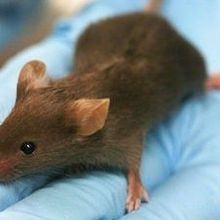Login
Subscribe404
Not Found
Is this what you were looking for?
tag colon cancer evolution developmental biology culture

Microfluidics: Biology’s Liquid Revolution
Laura Tran, PhD | Feb 26, 2024 | 8 min read
Microfluidic systems redefined biology by providing platforms that handle small fluid volumes, catalyzing advancements in cellular and molecular studies.

One Protein to Rule Them All
Shelby Bradford, PhD | Feb 28, 2024 | 10+ min read
p53 is possibly the most important protein for maintaining cellular function. Losing it is synonymous with cancer.
Colon cancer stem cells identified
Jeffrey M. Perkel | Nov 19, 2006 | 4 min read
Two groups independently identify CD133 as a potential marker of 'stemness'

Do Epigenetic Changes Influence Evolution?
Katarina Zimmer | Nov 1, 2022 | 10+ min read
Evidence is mounting that epigenetic marks on DNA can influence future generations in a variety of ways. But how such phenomena might affect large-scale evolutionary processes is hotly debated.

The Ephemeral Life of the Placenta
Danielle Gerhard, PhD | Dec 4, 2023 | 10+ min read
Recent advances in modeling the human placenta, the least understood organ, may inform placental disorders like preeclampsia.

Cancer and Immune Cells Merge
Kate Yandell | Dec 16, 2013 | 3 min read
Mouse colon cancer cells can fuse with macrophages, leading to changes in tumor growth.

Guts and Glory
Anna Azvolinsky | Apr 1, 2016 | 9 min read
An open mind and collaborative spirit have taken Hans Clevers on a journey from medicine to developmental biology, gastroenterology, cancer, and stem cells.

Cancer’s conversions
Nancy Gavert and Avri Ben-Ze ev | Nov 1, 2010 | 4 min read
A developmental transition may be a useful model for tumor progression.
Microbial Co-op in Evolution
Eugene Russo | Oct 5, 2003 | 7 min read
Courtesy of Michiel Vos, Max Planck Institute, Tübingen, Germany FRUIT FOR THE HUNGRY: Myxococcus fruiting bodies emerge from soil particles in response to starvation. Approximately 100,000 cells aggregate and communicate via chemical signals to form the bodies, and a portion of the population differentiates into stress-resistant spores. Most microbiologists consider used flasks, laden with splotches of colonizing bacteria, simply more dishes to wash. Paul Rainey sees more. For Rai

Capsule Reviews
Bob Grant | Nov 1, 2015 | 3 min read
The Psychology of Overeating, The Hidden Half of Nature, The Death of Cancer, and The Secret of Our Success